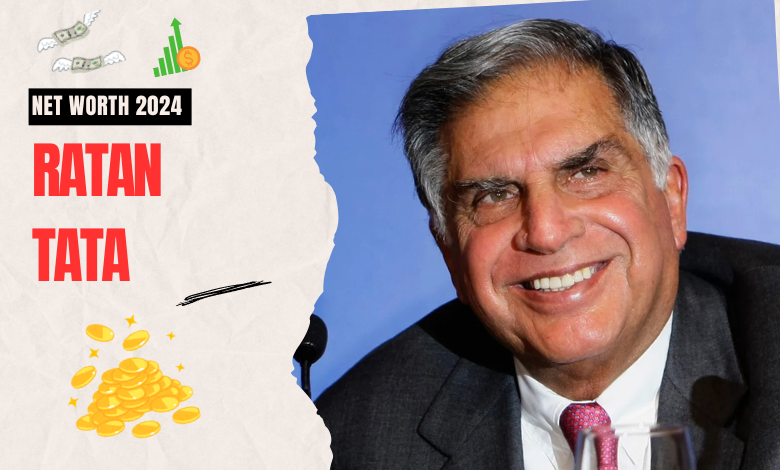Ratan Tata’s Net Worth: The Surprising Truth Behind His Wealth
Ratan Tata, the Late former chairman of the Tata Group, is widely regarded as one of the most influential business leaders in India. Known for his humility, visionary leadership, and philanthropic endeavors, Ratan Tata’s name commands global respect. Despite leading one of the largest and most successful conglomerates in the world, his personal net worth is often a topic of curiosity and speculation. In this article, we explore the surprising truth behind Ratan Tata’s wealth and why his net worth might be vastly different from what many expect.

The Tata Group: An Empire Without Personal Ownership
One of the key reasons behind the misconception about Ratan Tata’s wealth is the vast size of the Tata Group, which is a collection of over 100 companies spanning industries such as steel, automobiles, telecommunications, hospitality, and more. With globally recognized brands like Tata Motors, Tata Consultancy Services (TCS), Tata Steel, and Taj Hotels, the group’s combined revenue runs into billions of dollars.
However, Ratan Tata’s personal wealth is not directly tied to these companies in the way one might think. Unlike many prominent billionaires around the world who hold substantial personal stakes in the companies they lead, Ratan Tata does not own large personal shares in Tata Group companies. The reason lies in the unique structure of the Tata Trusts, which own around 66% of Tata Sons, the holding company of the Tata Group.
The Role of Tata Trusts in Ratan Tata’s Wealth
The Tata Trusts play a critical role in determining the wealth of Ratan Tata. These charitable organizations were set up by earlier members of the Tata family, including the founder Jamsetji Tata, to ensure that a significant portion of the group’s wealth is used for the betterment of society. Through Tata Trusts, the Tata family has been involved in philanthropy for over a century, funding various causes such as education, healthcare, rural development, and research.
Since Tata Trusts control a majority stake in Tata Sons, the profits generated by the Tata Group companies largely flow into these trusts, which use the funds for charitable purposes. This means that Ratan Tata does not personally benefit from the group’s massive earnings in the same way that traditional company owners or shareholders do. Much of the Tata Group’s wealth is locked into these trusts, making Ratan Tata’s personal net worth surprisingly modest compared to the scale of the company he led.
How Much is Ratan Tata Worth?
So, what is Ratan Tata’s actual net worth? While the exact figure may vary slightly depending on estimates, Ratan Tata’s personal net worth is believed to be around $1 billion or less. This may come as a surprise to many, especially given the Tata Group’s combined market capitalization, which runs into hundreds of billions of dollars.
Unlike other industrialists in India and around the world, Ratan Tata’s personal fortune is not tied to massive ownership of shares. Instead, his wealth largely comprises his personal investments, assets, and stakes in some companies outside the Tata Group, along with the modest earnings he has drawn during his career as a senior leader within the Tata conglomerate.
A Different Kind of Billionaire: Ratan Tata’s Philanthropic Legacy
Ratan Tata’s modest net worth, relative to the massive fortune his company generates, speaks to his unique philosophy of wealth and success. For him, the measure of success has never been about personal riches, but rather the impact that business can have on society at large.
Under his leadership, the Tata Group maintained a strong commitment to corporate social responsibility. Even after his retirement as chairman in 2012, Tata’s influence on the group’s philanthropic activities remains. The Tata Trusts continue to play a pivotal role in funding education, healthcare, and rural development projects across India. One of the most notable recent contributions is Tata’s role in establishing cancer treatment facilities throughout the country, providing critical care at affordable rates to millions of people.
In contrast to many other wealthy individuals, Ratan Tata has chosen to prioritize philanthropy over personal wealth accumulation, leading to a lasting legacy that is felt far beyond the corporate boardroom. This commitment to philanthropy and social good aligns with the values set by the Tata family since the group’s inception.
Comparing Ratan Tata’s Wealth to Other Business Leaders
When comparing Ratan Tata’s wealth to that of other prominent business leaders in India or globally, the difference is stark. For example, Mukesh Ambani, chairman of Reliance Industries, is often ranked as one of the richest men in the world, with a personal fortune exceeding $90 billion. This is primarily because Ambani directly controls a significant portion of the shares in his company.
Similarly, globally renowned billionaires like Jeff Bezos, Elon Musk, and Bill Gates have built personal fortunes that are tied to their ownership stakes in the companies they founded or led. Their personal wealth reflects the success of these companies in the stock market, often ballooning into the tens or hundreds of billions of dollars.
Ratan Tata, on the other hand, remains an anomaly in this regard. Despite overseeing a business empire that rivals the size of many global corporations, his personal wealth does not reflect the value of the conglomerate itself. This is largely due to his decision to uphold the Tata family’s tradition of philanthropy and not focus on personal wealth accumulation.
Why Ratan Tata’s Modest Net Worth is a Testament to His Character
Ratan Tata’s relatively modest net worth is perhaps the greatest testament to his character and values as a leader. In an age where personal wealth accumulation is often celebrated, Ratan Tata’s focus on giving back to society through the Tata Trusts sets him apart as a unique and inspiring figure.
Rather than leveraging his position to amass personal riches, Ratan Tata has dedicated his life to ensuring that the wealth generated by the Tata Group is used for the betterment of society. This sense of social responsibility and ethical leadership is one of the reasons why he is so deeply respected both in India and around the world.
As Ratan Tata himself has often said, “We are custodians of wealth, not owners.” This philosophy is reflected in the way the Tata Group has operated for decades, and in how Ratan Tata has led his life, using wealth not for personal gain but for the greater good.
A Quick Review : Ratan Tata’s Legacy Beyond Wealth
In a world where billionaires are often judged by the size of their fortunes, Ratan Tata’s story offers a different perspective. His modest net worth, despite leading one of the most influential and successful conglomerates in the world, is a reflection of his commitment to social good, corporate ethics, and philanthropy.
For Ratan Tata, success has always been about creating value for society, not personal wealth. His legacy, therefore, is not just in the billions of dollars the Tata Group generates but in the millions of lives that have been touched by the Tata Trusts and the companies’ numerous philanthropic efforts. This is the true wealth of Ratan Tata—one that cannot be measured in monetary terms alone.










